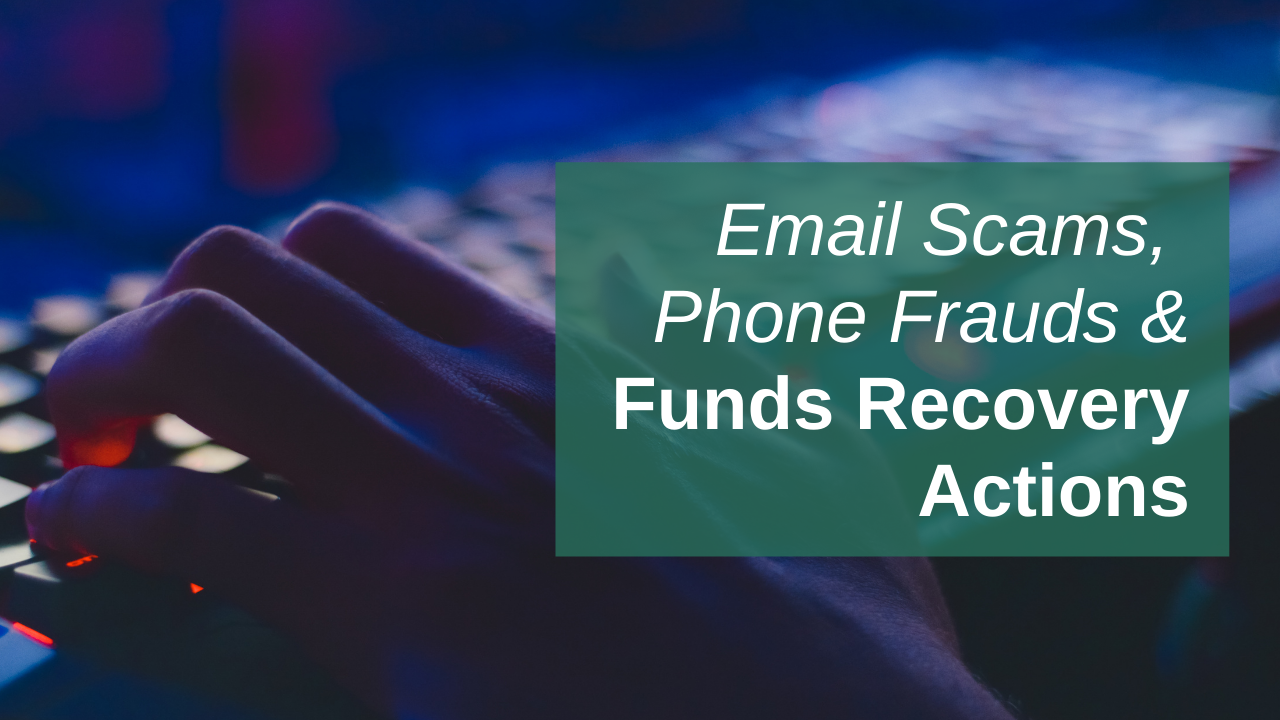Hong Kong has always been a hotspot for the nefarious activities of scammers. According to the latest police figures, HK$2.5 billion were defrauded in email scams in 2019, which have surged by 47.8% from the preceding year. In 2019, scammers fleeced a Japanese publishing conglomerate out of US$29 million by impersonating its management executive. The stolen money was diverted to accounts based in Hong Kong. In March 2020, a Hong Kong investment firm was conned out of US$5.25 million in an email scam.
In this article, we discuss the usual pattern of the prevailing scams and the essential tips if you unfortunately become a victim of these fraudulent schemes.
A. Pattern of Scams
Phone Fraud
Victims usually receive calls or pre-recorded messages impersonating officers from Post Offices or Courier Companies saying they have a parcel being withheld at the border and requesting the victims to pay money with different excuses. Other examples are calls from Immigration Department alleging that victims will be subject to immigration limitation or calls alleging that victims' family member is being detained or has got injured (probably in China) and need urgent money to save them. By all excuses, the purpose of scammers is to induce victims to believe in their "story” and pay money on their instructions.
Email Fraud
Email scams are typically perpetrated in the form of "CEO fraud phishing". Fraudsters first hack into the email accounts of their targeted companies to learn about their businesses and payment patterns. Then, fraudsters impersonate as victims' business partners, co-workers, bosses, or even trusted friends by using a highly similar email address and request victims to change the original recipient bank to the fraudster's designated bank.
Once the money has been paid, the defrauded money will usually be transferred into other bank accounts in Hong Kong or overseas in batches within a short period of time. Given the convenience of e-banking service nowadays, in most situations, when the victim eventually discovers or realizes the fraud, it is too late.
B. Trace, Freeze and Recover the Stolen Money
Immediately on the discovery of fraud, victims should take the following actions:
1. Contacting the banks
Contact your bank to stop the mistaken payment or transfer, if possible. If the mistaken payment or transfer has completed, try to contact the recipient bank to stop any further payment or transfer out of the fraudster's account. Although the recipient banks have a contractual duty to honor the instructions of clients (for example fraudster's instruction to transfer the swindled monies out of the account), they will accommodate the victim's request to the extent possible as they do not wish to get involved in any fraudulent schemes and violate the anti-money laundering legislations. In any event, the report to the bank is helpful in establishing victims' claims in civil action for recovery of the lost money.
2. Reporting to the Police
Report to the Hong Kong Police of the fraud. Victims overseas can also report the crime to the Hong Kong Police by an online reporting system. If the money has been transferred out of Hong Kong, victims should also consider reporting to the police there.
With sufficient evidence to establish fraud, the Hong Kong police will start criminal investigations and their Joint Financial Intelligent Unit (“JFIU”) may liaise with the relevant bank and request to "freeze” the bank account concerned. This is not a formal freezing Order at law but the bank will generally comply with it to avoid violating the anti-money laundering legislations. The police may take 2 to 3 days to complete the “freezing” process.
3. Applying Injunction Order and Disclosure Order
In appropriate circumstances, victims should consider applying for urgent proprietary injunction or/and Mareva injunction on an ex parte basis (i.e. without notice to the other party) in order to freeze the relevant bank account or the fraudster's assets before the money has been dissipated. In making such applications, victims may at the same time apply for ancillary disclosure orders against the bank and the Defendant for details of any subsequent transfers.
4. Commencing Civil Action
The Injunction Order will not give the victim priority over the frozen money or the right to ask the relevant bank to release the money to the victim. The victim has to commence civil actions against the bank account holders/fraudsters. Only after judgment is obtained, the victim may request the relevant bank to release the money pursuant to the Court Order. As fraudsters rarely defend such a claim against them, a default judgment (i.e. judgment obtained in default of Defendant's Acknowledgment of Service of Writ of Summons or a Defence) will be sought in most instances.
If there are other competitors of the money sitting in the relevant bank account other than the victim, the monies are claimed on a first-come, first-served basis. Thus, victims must act swiftly.
Conclusion
Recovery of the defrauded money involves complex legal processes. It often requires commencing legal action in other jurisdictions as the swindled money is usually laundered through a lot of bank accounts located in different countries. Thus, it is of paramount importance to consult your lawyers once fraud is discovered. Your lawyer will advise on the best legal course of action to recover the lost money.
Nevertheless, as the old saying goes, 'prevention is better than cure', the best approach is always to adopt precautionary measures to protect themselves against these crimes. Here are some tips:
- Avoid using the letter “o” or number “0” in your email address;
- Avoid a long recipient or cc list in email chains;
- Always double-check with your business partner on the correct payment instruction of any contemplated payment;
- Confirm by other means of communications, preferably telephone, if your business partner suddenly requests for a change of payment instruction;
- Stay alert of any suspicious transactions or payments.





